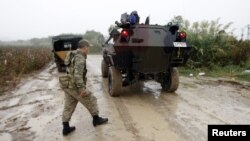ANKARA —
Turkish Prime Minister Tayyip Erdogan's government, which faced a wave of street protests and riots this month, moved on Thursday to amend an article of the Armed Forces charter cited by generals in the past to justify coups as defense of public order.
Since he was first elected in 2002, Erdogan has radically cut back the power of a military that had toppled four governments in 40 years. The last administration felled, in 1997, was led by an Islamist party to which Erdogan belonged.
Deputy Prime Minister Bekir Bozdag told reporters the government had submitted proposals to parliament to amend article 35 of the charter, promulgated after a 1960 coup that resulted in the hanging of a prime minister. Erdogan has cited that prime minister, Adnan Menderes, as a political model.
The article was later used as the basis for interventions in 1970 and in 1980, to end months of left-right streetfighting, as well as 1997 when the army saw a danger from political Islam.
The amendment would replace the declared duty to “protect and watch over the republic” - a reference that for many Turks would imply strictly enforcing a secular order - with a more limited obligation to defend “the Turkish homeland against foreign threats”.
Coup allegations
Erdogan, who has won three elections and despite recent protests has no clear political rivals, denies accusations he seeks to overturn the 90-year-old secular order. But in speeches in recent weeks he has railed against what he sees as the oppression of pious muslims under previous governments.
Opponents accuse him of becoming increasingly authoritarian.
Hundreds of top officers have been arrested in recent years as part of an investigation into alleged plots against Erdogan. One, code-named 'Ergenekon' foresaw the engineering of street protests and killings opening the way for an army takeover.
Erdogan blamed this month's protests and rioting - the largest show of public defiance of his time in office - on a foreign-backed conspiracy involving market speculators, “terrorist” groups and looters.
The demonstrations drew in leftists, secularists, nationalists, professionals, unions and students after police used water cannon and tear gas in a heavy handed attempt to disperse an initial demonstration against the development of an Istanbul park.
Parliament will discuss the bill in October after its summer recess.
Since he was first elected in 2002, Erdogan has radically cut back the power of a military that had toppled four governments in 40 years. The last administration felled, in 1997, was led by an Islamist party to which Erdogan belonged.
Deputy Prime Minister Bekir Bozdag told reporters the government had submitted proposals to parliament to amend article 35 of the charter, promulgated after a 1960 coup that resulted in the hanging of a prime minister. Erdogan has cited that prime minister, Adnan Menderes, as a political model.
The article was later used as the basis for interventions in 1970 and in 1980, to end months of left-right streetfighting, as well as 1997 when the army saw a danger from political Islam.
The amendment would replace the declared duty to “protect and watch over the republic” - a reference that for many Turks would imply strictly enforcing a secular order - with a more limited obligation to defend “the Turkish homeland against foreign threats”.
Coup allegations
Erdogan, who has won three elections and despite recent protests has no clear political rivals, denies accusations he seeks to overturn the 90-year-old secular order. But in speeches in recent weeks he has railed against what he sees as the oppression of pious muslims under previous governments.
Opponents accuse him of becoming increasingly authoritarian.
Hundreds of top officers have been arrested in recent years as part of an investigation into alleged plots against Erdogan. One, code-named 'Ergenekon' foresaw the engineering of street protests and killings opening the way for an army takeover.
Erdogan blamed this month's protests and rioting - the largest show of public defiance of his time in office - on a foreign-backed conspiracy involving market speculators, “terrorist” groups and looters.
The demonstrations drew in leftists, secularists, nationalists, professionals, unions and students after police used water cannon and tear gas in a heavy handed attempt to disperse an initial demonstration against the development of an Istanbul park.
Parliament will discuss the bill in October after its summer recess.





